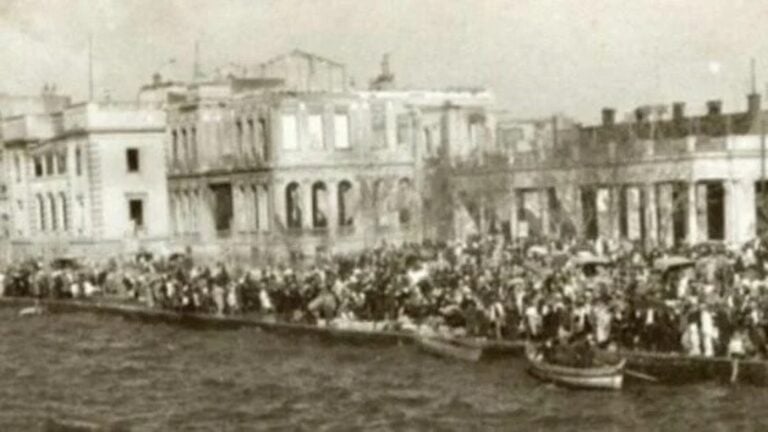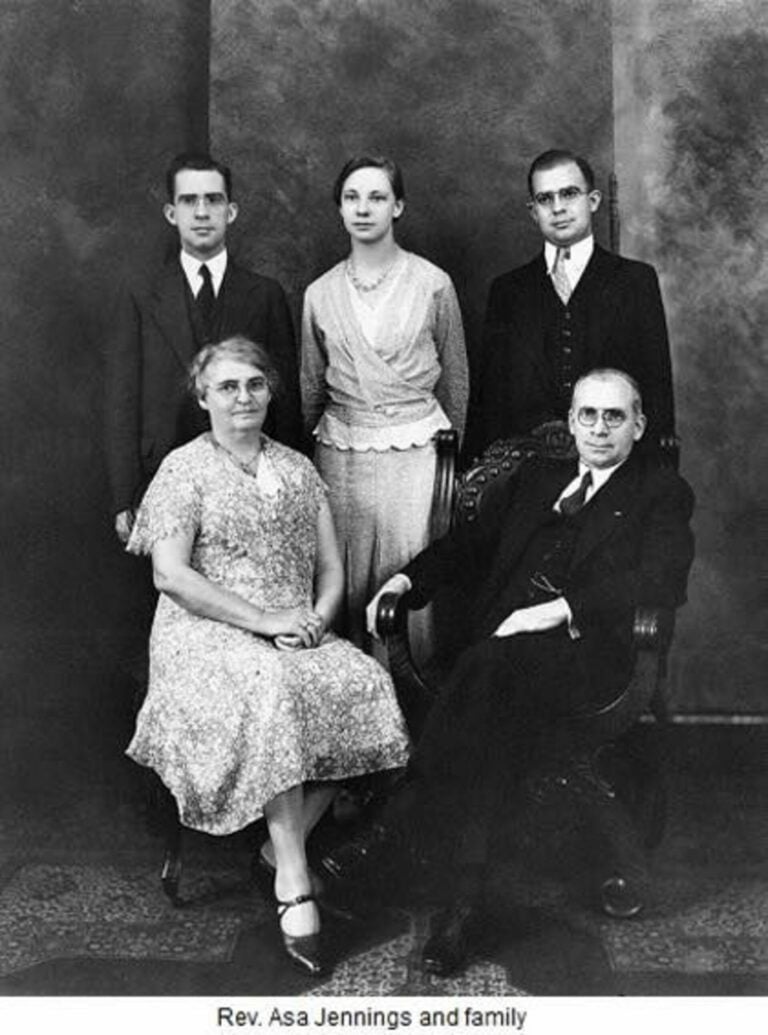Smyrna’s unsung American a hero who saved a million Greeks

My Pappou is from the coastal city of Aivali in Asia Minor now Turkey. Every time I visit, via a short boat ride from Lesvos, I am greeted by people who speak Greek. They are Turkish. I look at the buildings that have remained for over a century.
Greek neo classical buildings no longer under Hellenic ownership. Tragically.
Just two and bit hours away on the same coastline is Smyrna. My yiayia has heritage from here and it is from Smyrna that my pappou escaped the horrors of the 1922 catastrophe.
Rather than provide you a history lesson , or about how the Monarchy and monarchists let the Greek cause down, or how the Bolsheviks provided significant money, weapons and men to the Kemalists, or how poor the strategy was after Venizelists were removed from leadership in 1921; I will provide you with a story of a man, a hero. He may not be a charismatic Zelensky, but this hero is one that hundreds of thousands of people, if not millions, owe their lives to.
I want to introduce one the greatest heroes in the world. A hero saved the lives of hundreds of thousands of Greek speakers, but who wasn’t a Hellene. He was an inconspicuous American, someone who at first glance one may miss. Asa Jennings, a missionary with the YMCA was a small man at five-foot two-inch, man with a hunch. He happened to be in Smyrna a century ago when the disaster of the Asia Minor catastrophe ruined lives forever.

Smyrna, once was Greek
In 1918, the Greek military with an air of triumphalism made its way to the coast of Smyrna, a Greek and Christian majority city in Asia Minor. Not since the city of Philadelphia fell to the Ottomans in 1390 had the Hellenes controlled territory in the region.
Relations between Greeks, Armenians, Assyrians and Jews with the Ottomans was tense. Killings, death marches and a tragic end to the melded history between these peoples and Anatolia unfolded bloodily. And yet the catastrophe could have been stopped by the Allies of Europe. The 20th Century brought with it horrific destruction born of nationalism.
Jennings whole purpose in life was to help and it didn’t matter what was one’s ethnicity. In Smyrna Muslim and Christian, generally got along until then.
The great tragedy
By September 1922, a defeated Greek military made a heartless exit from Smyrna, and the forces of Kemal Ataturk entered a city where Turks were already on a wave of bloody retribution for the Greek occupation. A city that had known peace even in World War I was put to the torch. Whole suburbs were raised and citizens rounded up. Many were executed in cold blood, others were forced into the harbour where they remained for two weeks; hungry, and bathed in fear.
All the while allied warships, English, French and others, remained ‘neutral’ in the harbour of Smyrna.
The Europeans beat back those that tried to flee the bloodletting and many drowned. A Japanese merchant vessel that sailed past was so disgusted with callousness of the Europeans they dumped their entire cargo landed and took in Greek refugees, fearless Japanese saviours of Greeks.
The American embassy protected as many as they could. Hundreds. But hundreds of thousands needed protection. And here came, Asa.
The Christian parts of the city was in ruins, people begged for their lives, so he made a dash to see Ataturk. The Father of the Turks and recipient of support from the Bolshevik Russians.

Asa the Great
Asa was unwilling to take no for an answer from Turkish troops, and forced his way into Ataturk lodgings. Kemal was intrigued by an American who sought to protect the Greeks and the other minorities. He doubted that Asa could rescue the Greeks, but he made a deal.
The deal was simple, he gave him a few days to take as many refugees to Greece. Asa had no resources and the Turkish military saw him as a fool. Asa undeterred began his rescue attempts. He established a first aid facility for pregnant women on the docks. Then he made his way to a US naval ship.
Asa began negotiating with the ‘neutral’ US ship. When evening fell, he and the crew spotted a swimmer in distress – a naked woman. Some of the crew were unwilling to rescue the swimmer. Asa condemned this cowardly act, and forced them to rescue the swimmer on moral grounds, against orders. Asa then ensured that a young boy who had been secretly rescued by other US sailors earlier to be united with the woman, who was his sister.
Next Asa negotiated with an Italian ship to take refugees who could pay a fee. Disgusted that people could profit from human suffering, he was able to rescue 2000 more Greeks and accompanied the ship to Mytilene.
An American destroyer followed the ship so as to return Asa back to Smyrna.
A defeated Greek navy with around 25 ships lay prostate at anchor. With confidence and Ataturk’s imprimatur, Asa called an extraordinary meeting of the British Consul, the and the defeated Greek military and navy. Many of the Greeks in the military were unwilling to help their fellow Hellenes. Asa made his way onto a Greek ship, Kilkis where he was supported by captain, Ioannis Theofanidis.
He then sent a message via the ship to the Greek Government of Athens and called on them to support his efforts to rescue the refugees. The Government was not entirely disposed to an American ordering them, as they contemplated their humiliation in Asia Minor.
Then a masterstroke. Asa told the government that unless they agreed to the fleet sailing with him by 6pm he would broadcast to the entire world their “cowardly” rejection of his pleas.
The government embarrassed gave Asa the command of the entire fleet in the Aegean, one of the most extraordinary decisions in naval history. An American in control of a Greek fleet. Asa, with no naval or military expertise, became a commodore.
A surprised Ataturk agreed to the ships under Asa entering the harbour of Smyrna to rescue all refugees, except men aged between 18 – 45 years, they were set aside for death marches. Athens provided a further 25 ships on the condition that each ship that entered the Smyrna docks must be escorted by an American warship.
His next hurdle was the attitudes of ship captains. No one wanted to return to a city that had been destroyed. Asa reminded each one that should they attempt to call in unseaworthy ships, he would have them court marshalled. The threat worked.
By midnight the fleet had set sail and the US was therewith a frigate to support the operation. The docks were the epitome of misery. One of the wealthiest cities in the world, one that had been tolerant to everyone was now a scene of horror.
Every possible hurdle was overcome by Asa who managed an historic evacuation. Americans came to the aid of Asa, and helped in every way, whilst the French, Italian, British, and Turk did nothing.
I spoke with his grandson, Roger Jennings, who said he has Asa’s diaries. “On the 90th anniversary of the rescue, the United Methodist Church in Cleveland, where my grandparents are buried, invited me to speak to the congregation about my grandfather who is buried in their cemetery.”
“MGM produced a short film, Strange Destiny, and the technical adviser was my father,” said Jennings.
Jennings told of how Greeks would kneel when his grandfather walked down the street “as though he was carrying the Host”.
“Asa was very embarrassed by this attention, he never wanted attention.”
Within days, Asa cleared Smyrna of refugees, and his actions saved over 350,000.
Most of the refugees ended up in Athens, Thessaloniki, nearby islands and Lesvos.
Asa became the Greek and the Turkish representative of the prisoner of war exchange. Greek authorities and Ataturk simultaneously nominated him. He continued to evacuate other refugees from Asia Minor for over a year. Asa is thought of fondly by Greeks and Ataturk for his courage and each country awarded him.
Roger Jennings
Yet in Volos, there has been a concerted effort to recognise Asa with Roger addressing the people there in February 2016.
Asa passed away in 1933, easily the best-known American in Asia Minor. He may have been forgotten by a Greece that has spent years dealing with war and political issues, though his deeds have resulted in the birth of millions.
No one in the Greek world should forget what Asa did, a man who saved over one million people over the course of a year.
To a man is a hero, I, with all the descendants of the Asia Minor catastrophe salute him, “Hail to the Commodore”.
A book from Roger Jennings Waking the Lion is available through Amazon, and it is a must read, compiled from 2500 documents that Asa provided his family.
Address of Roger Jennings about the rescue:
*Billy Cotsis has ancestry from Lesvos and Asia Minor and is the author of The Aegean Seven Take Back The Marbles
Neoskosmos.com










Σχόλια Facebook